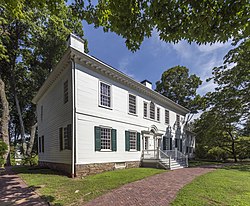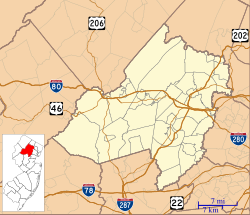Ford Mansion
|
Ford Mansion
|
|

Ford Mansion in 2016
|
|
| Location | Morristown, New Jersey, United States |
|---|---|
| Coordinates | 40°47′47″N 74°28′00″W / 40.79639°N 74.46667°WCoordinates: 40°47′47″N 74°28′00″W / 40.79639°N 74.46667°W |
| Built | 1774 |
| Built by | Jacob Ford, Jr. |
| Architectural style | Georgian style |
| Part of | Morristown National Historical Park (#66000053) |
| NJRHP # | 3381 |
| Significant dates | |
| Designated CP | October 15, 1966 |
| Designated NJRHP | May 27, 1971 |
Located in Morristown, New Jersey, USA, the Ford Mansion is a classic 18th-century American home built by Jacob Ford, Jr. in 1774 and now owned by the National Park Service as a part of the Morristown National Historical Park.
It was acquired by the Washington Association of New Jersey in 1873. The Georgian-styled mansion is known for being George Washington's headquarters from December 1779 to June 1780 during the American Revolutionary War.
The house has a Georgian-style exterior, but the interior kitchen and framing shows evidence of Dutch influence. According to Alan Gowan, "the boarding of the Ford Mansion was laid evenly painted and scored to look like a fine masonry with quoins at the corners". The mansion was made with palladian window above the door and a stylish cornice. The fancy architecture was not created to look appealing, but to showcase the wealth of the family who owned the building.
The headmaster's section of the house was built with symmetrical rooms on both side of the foyer. The office is across from the library and the parlour is across from the dining room. On the second floor there are symmetrical bedrooms for each side of the hallway. The servant's section of the house was near the kitchen and the pantry on the east side. The grand hall and the parlor are what categorized the house as a mansion. Unlike most mansions at the time, the Ford Mansion did not use bricks for the exterior, but painted flush board and clapboards.
George Washington and the Continental Army were obliged to set up an encampment in Morristown because of transportation problems. Washington liked Morristown's "defensible terrain, important communication routes, and access to critical resources.". The Ford family had businesses in iron mines, iron forges, a gristmill, a hemp-mill, and a gunpowder mill that were all stationed near the house. These businesses were useful to the army in getting resources.
...
Wikipedia



